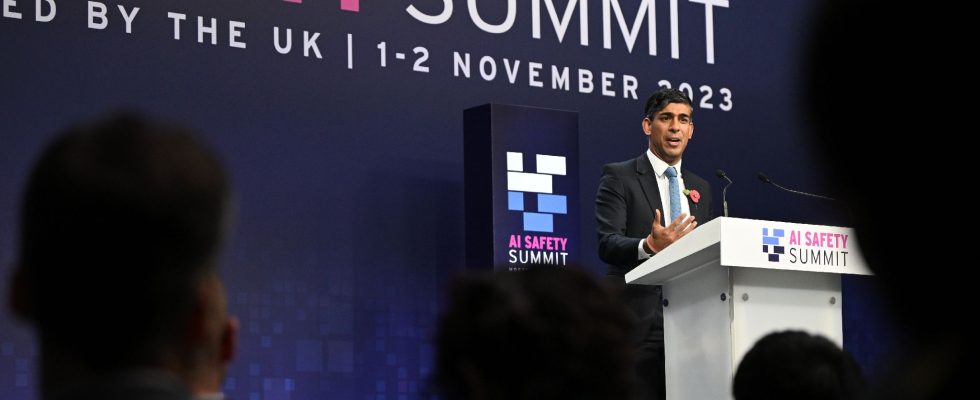The first global artificial intelligence (AI) summit ended this Thursday, November 2, near London, at Bletchley Park (England). Around a hundred experts, business leaders and political leaders handpicked such as the President of the European Commission Ursula von der Leyen, the American Vice-President Kamala Harris and the Italian Prime Minister Giorgia Meloni, focused for two days on the dangers posed by the exponential progress of AI. The objective was to agree on joint action to set up barriers to prevent any drift in technology. Here’s what you need to remember.
Signing of an agreement and “shared responsibility”
From the start of the meeting on Wednesday, major world powers like China, the United States and the EU “agreed on a shared responsibility” in the face of the risks of AI, signing the “historic” Bletchley declaration , welcomed British Prime Minister Rishi Sunak. The latter then announced the main success of this meeting, an agreement between governments and companies to “work together on the security of new AI models before their launch”.
“At the moment, those who test AI models are the companies that develop them,” explained the British Prime Minister. And to specify: “In this sense, I took the decision, with American Vice-President Kamala Harris, to establish AI security institutes, in cooperation with our two governments.”
First report on the “state of the science”
The participants also agreed to entrust Canadian researcher Yoshua Bengio, a figure in the sector and winner of the Turing Prize in 2019, with the first report on the “state of science”. This will need to carry out a scientific assessment of existing research and the risks and possibilities of AI, then set priorities to inform future work on the safety of this cutting-edge technology.
“United” and “global” response
United Nations Secretary-General Antonio Guterres, for his part, called for a “united, sustainable and global” response to the risks linked to the meteoric rise of artificial intelligence. At a summit, he said that “the principles of AI governance should be based on the Charter of the United Nations and the Universal Declaration of Human Rights.”
Exchange between Elon Musk and Rishi Sunak
During a conversation with British Prime Minister Rishi Sunak on the sidelines of the first global AI summit, Elon Musk predicted that the future of AI would be an “age of abundance”, with a “universal income high” rather than a universal basic income, but warned that “humanoid robots” could drive out humans.
He felt that there would come a time when “no work is necessary.” Jobs instead would only be for those who wanted one for “personal satisfaction”, he added. AI is like “a magical genie” that makes all your wishes come true, Elon Musk said, while reminding us that these fairy tales rarely end well. “One of the future challenges is how to find meaning in life.”
Next summit in France
During the summit, French Economy Minister Bruno Le Maire on Wednesday called on the European Union to “innovate” before regulating the development of artificial intelligence (AI). Faced with the giants that are the United States or China, “if the European Union wants to stay in the race for artificial intelligence in the 21st century, all European countries must pool their strengths, their skills, their technologies, and invest more widely and more quickly,” he told the press.
France will host the next edition of this summit on the security of artificial intelligence in Paris, after a virtual edition in six months in South Korea. Until then, “we must focus on short-term risks, such as disinformation”, the impact of AI on employment, and the concentration of technology in the hands of a handful of actors private, explained Bruno Le Maire, because “this is not compatible with the interests of citizens and States”.
